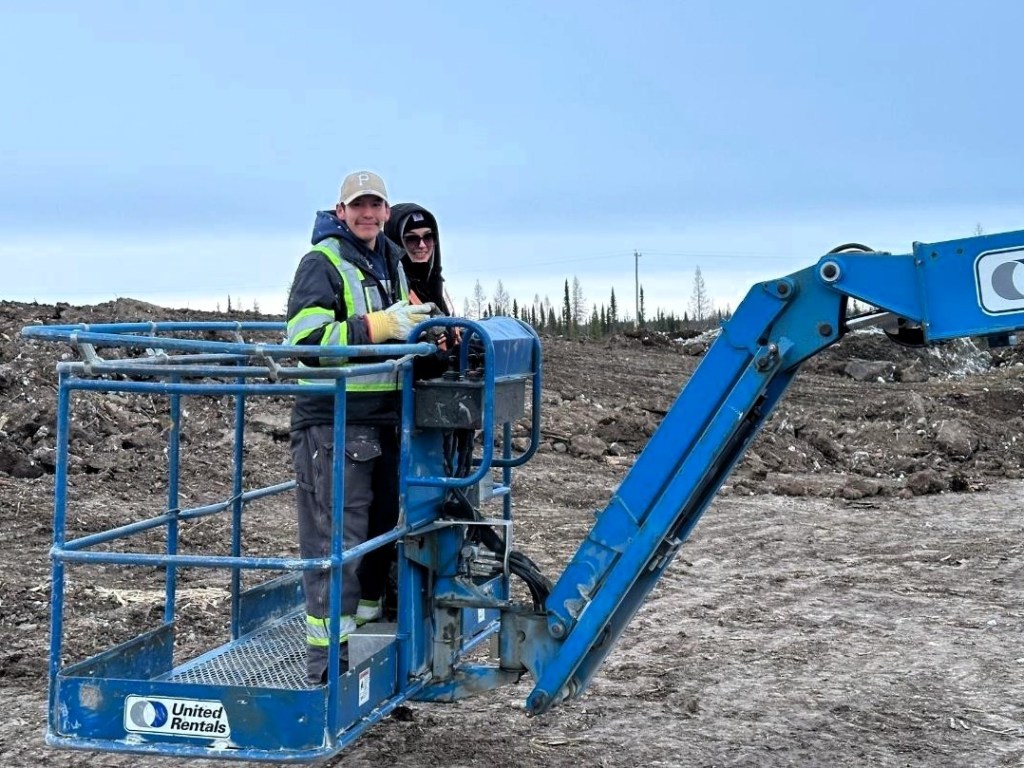Related news
Discover more stories about Mitacs — and the game-changing innovations driven by students and postdocs.
Professor Shirley Thompson from the University of Manitoba leads the academic efforts, Chief Darryl Wastesicoot represents the Kawéchiwasik Development Corporation (KDC), which is a corporation under York Factory First Nation that ensures the project meets community needs. Oni Babajide, a Mitacs intern and project manager, bridges the gap between academia and the community, facilitating effective collaboration and training.
In the remote lands of York Factory First Nation, located in northern Manitoba, the Wikiwin Training Enterprise is a beacon of innovation.
This Mitacs-supported initiative brings together students at the University of Manitoba and the York Factory First Nation to combat a severe housing crisis while providing vital educational opportunities.
The Wikiwin project is about more than just building houses; it’s about constructing futures — creating new employment opportunities — through a blend of hands-on experience and multimedia resources.
Over the past 18 months, the Wikiwin project has created a unique training centre cohort, the first of its kind at the university.
 Mitacs interns who are UM students receive safety training before embarking on various construction tasks while studying. They explore fields such as environmental design, architecture, engineering, and sustainability, providing them with versatile skills for future employment and diverse opportunities within the construction field.
Mitacs interns who are UM students receive safety training before embarking on various construction tasks while studying. They explore fields such as environmental design, architecture, engineering, and sustainability, providing them with versatile skills for future employment and diverse opportunities within the construction field.
This program enables year-round house building and provides apprenticeships for Indigenous youth. So far, Wikiwin has graduated 70 students from various areas of carpentry, 12 of which who were Mitacs-funded interns.
The project was enabled by Mitacs’s Indigenous Pathways initiative, which provides greater access to opportunities for Indigenous business owners and researchers by reducing the amount of investment from the host organization for the internships.
Dr. Shirley Thompson, Associate Professor at UM’s Natural Resources Institute, highlights the challenges faced due to the remote location of York Factory First Nation.
“You have to drive two hours from Thompson and then take a two-hour ferry ride just to reach the community,” she explains. “This isolation has exacerbated the housing crisis, with many families living in substandard conditions.”
One significant challenge was adapting the university system to accommodate a cohort-based learning model, which emphasizes group learning.
The 12 Mitacs-funded students, along with members from York Factory, and other UM students were selected to manage, design, and build this transformative project. This approach focuses on fostering peer support and mentorship to build a strong community.

Dr. Thompson noted, “It’s always hard to be the change maker, but it’s necessary for progress.” York Factory First Nation has long struggled with inadequate housing, a problem due to the community’s remoteness.
The Wikiwin project tackled this crisis head-on, addressing not only the immediate need for housing but also empowering the community to innovate and design homes that resonate with their cultural and environmental context.
Oni Babajide, former Mitacs intern and current project manager, highlighted the broader impact of the initiative. “Many of the students I worked with had families living in dire situations. The Wikiwin project was able to renovate houses and provide them with better living conditions. Their quality of life increased, and that didn’t just happen for one or two students; that happened for many students and community members.”
Despite facing these hurdles, this community-led education and research initiative played a crucial role in building a skilled workforce, and many students found support and adaptation through the Wikiwin project and its team.
Chief Darryl Wastesicoot of York Factory First Nation, along with community mentors and experts, worked closely with students to provide the support and guidance needed to ensure there was community and traditional aspirations.
At its core, Wikiwin’s impact extends far beyond providing employment. With a keen focus on sustainability, the project advocates for the use of locally-sourced materials.

In the past, non-insulated houses and issues like mold troubled the community. Now, harnessing the power of stone, wood, and other local sources to create homes that would not only be durable, but thrive in the harsh northern climate.
“Stone can be a very good material for climate change housing,” remarks Babajide, highlighting the project’s innovative approach.
Looking ahead, the Wikiwin project plans to explore innovative building solutions, such as solar power and energy-efficient models. The goal is to continually improve and study indoor air quality and post-occupancy housing quality.
Ultimately, the Wikiwin project has built more than houses; it has built confidence and skills among York Factory First Nation youth. By providing training and apprenticeships, the project ensures that these individuals can continue to contribute to their community and beyond, promoting reconciliation and improving the quality of life for Indigenous communities.
Chief Darryl encapsulated the project’s impact: “Indigenous people are Canada’s most underutilized talent. The Mitacs-funded Wikiwin project brings the university to us up North so we can train for those engineering and higher professional positions. We have to look at different ways to educate our people.”
Mitacs’s programs receive funding from multiple partners across Canada. We thank the Government of Canada, the Government of Alberta, the Government of British Columbia, Research Manitoba, the Government of New Brunswick, the Government of Newfoundland and Labrador, the Government of Nova Scotia, the Government of Ontario, Innovation PEI, the Government of Quebec, the Government of Saskatchewan, and the Government of Yukon for supporting us to empower Canadian innovation.
Do you have a business challenge that could benefit from a research solution? If so, contact Mitacs today to discuss partnership opportunities: BD@mitacs.ca.